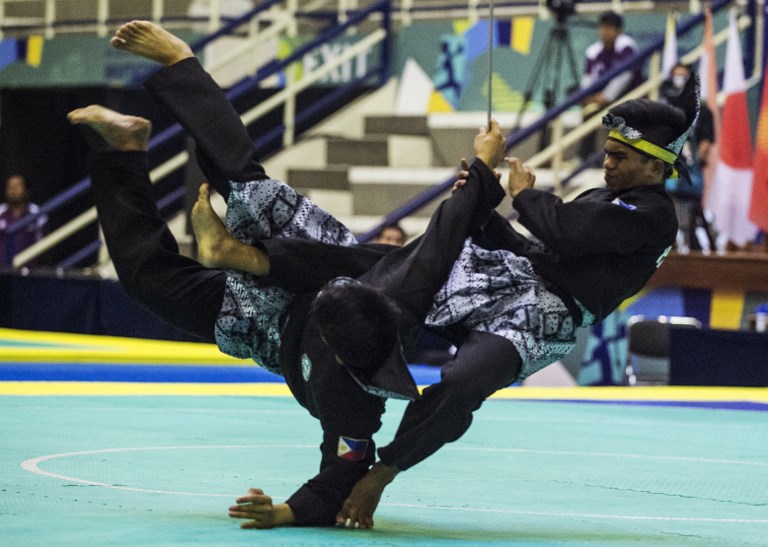Kurash, bridge and sambo: 10 unusual Asian Games sports

Almohaidib Abad and Alfau Jan Abad (L) of Philippines perform during men’s double final of Asian Games 2018 test event in Jakarta on February 14, 2018. AFP PHOTO / BAY ISMOYO
JAKARTA—Anyone for sepak takraw? Or perhaps a spot of bridge? We take a look at 10 of the more unusual sports being contested at the Asian Games in Jakarta:
Pencak silat
Legend has it that the ancient Indonesia martial art originated after a woman watched a tiger do battle with a giant hawk, and copied their techniques to fight off a pestering group of drunken men.
The term pencak silat describes hundreds of indigenous combat styles in Southeast Asia, with fighters wielding a terrifying array of weapons such as knives, sickles and machetes. Not for the faint-hearted.
Sambo
A Russian-Soviet form of fighting developed by the Red Army a few years after the Bolshevik revolution in 1917 to sharpen hand-to-hand combat skills.
The sport’s name is an acronym of the Russian for “unarmed self defense” and points are awarded for throws and submissions.
Sepak takraw
Wildly popular in southeast Asia, this gravity-defying form of “foot volleyball” has become an Asian Games smash-hit since it was first introduced in 1990 and is largely dominated by Thailand.
An explosive sport in which players acrobatically contort their bodies to launch a rattan ball over a net using their feet, head or chest with the sort of skill that would make Lionel Messi proud.
Bridge
Yes, the card game. For many, impenetrably complicated and lacking the sex appeal of poker. Bridge, which conjures images of cucumber sandwiches and rainy afternoons in village halls, is making its Games debut.
Billionaire tobacco tycoon Michael Bambang Hartono, 78, will be Indonesia’s richest competitor — but still not the oldest. That honor goes to Malaysia’s 81-year-old player Lee Hung Fong.
Kabaddi
A tag-meets-rugby contact sport rooted in Indian mythology and said to date back 5,000 years, kabaddi has proven a fan favorite — although India has won every gold medal since it became an Asian Games sport 28 years ago.
The game requires yoga-like breathing skills as two seven-player teams send a raider into enemy territory to tag an opponent before returning to safety -– all while chanting “kabaddi, kabaddi” to prove they’re not using more than one puff.
Kurash
An ancient form of wrestling from Uzbekistan which historians claim dates back thousands of years, kurash was a training technique for soldiers of 14th-century conqueror Amir Timur, whose empire stretched from Persia to central Asia.
Like sumo, though less roly-poly in nature, kurash focuses on strength and stamina. Wrestlers use towels to hold their opponents, and bouts are won by throwing or tripping an opponent onto their back.
Tenpin bowling
Viewed by many as cartoon character Homer Simpson’s idea of a workout, bowling has been an Asian Games event since 1978.
South Korea in particular takes it super-seriously and has won almost twice as many gold medals as closest challengers, Japan — perhaps proving that bowling is more than just a beery after-work hobby spent wearing someone else’s shoes.
Jet-ski
Better known as the flash pursuit of the glitterati in sun-splashed sea resorts, jet-ski is another of the 10 sports that are appearing at the Asian Games for the first time.
Indonesia expects local star Aero Aswar, the world champion in the runabout stock category in 2014 and runner-up in 2017, to lead the hosts to gold.
Paragliding
Another one for the adrenaline junkies, paragliders will take the skies for the first time at an Asian Games.
The sport has come under scrutiny following the death of 44-year-old Hong Kong flier Patrick Chung. Hong Kong paraglider Cheung Yuk-wah also pulled out of the Games after crashing into a lake in Austria, according to local media.
Dragon boating
Believed to date back to more than 2,000 years, when it started in south-central China, the ancient sport of dragon boat racing retains many ceremonial and religious overtones.
China and Indonesia have won three gold medals apiece since the colorful sport made its Asian Games debut in 2010 and they will be the teams to beat again, although the gap to their challengers has closed in recent years.














